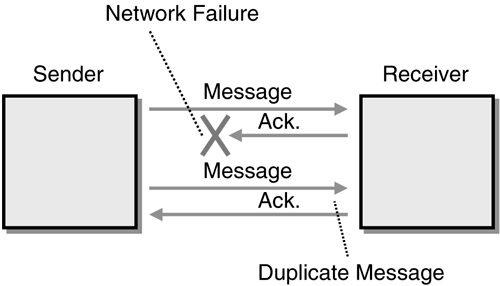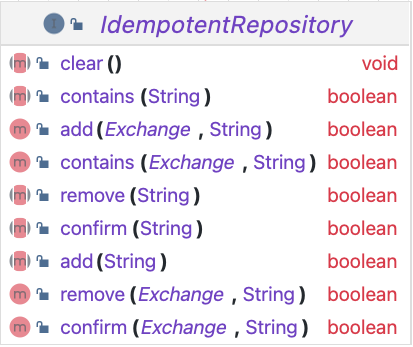1
2
3
4
5
6
7
8
9
10
11
12
13
14
15
16
17
18
19
20
21
22
23
24
25
26
27
28
29
30
31
32
33
34
35
36
37
38
39
40
41
42
43
44
45
46
47
48
49
50
51
52
53
54
55
56
57
58
59
60
61
62
63
64
65
66
67
68
69
70
71
72
73
74
75
76
77
78
79
80
81
82
83
84
85
86
87
88
89
90
91
92
93
94
95
96
97
98
99
100
101
102
103
104
105
106
107
108
109
110
111
112
113
114
115
116
117
118
119
120
121
122
123
124
125
126
127
128
129
130
131
132
133
134
135
136
137
138
| public class ExchangeIdempotentConsumerTest extends ContextTestSupport {
protected Endpoint startEndpoint;
protected MockEndpoint resultEndpoint;
private MyIdempotentRepo repo = new MyIdempotentRepo();
@Override
public boolean isUseRouteBuilder() {
return false;
}
@Test
public void testDuplicateMessagesAreFilteredOut() throws Exception {
assertEquals(0, repo.getExchange().size());
context.addRoutes(new RouteBuilder() {
@Override
public void configure() throws Exception {
from("direct:start").idempotentConsumer(header("messageId"), repo)
.to("mock:result");
}
});
context.start();
resultEndpoint.expectedBodiesReceived("one", "two", "three");
sendMessage("1", "one");
sendMessage("2", "two");
sendMessage("1", "one");
sendMessage("2", "two");
sendMessage("1", "one");
sendMessage("3", "three");
assertMockEndpointsSatisfied();
assertEquals(6, repo.getExchange().size());
for (Exchange exchange : resultEndpoint.getExchanges()) {
assertTrue(repo.getExchange().contains(exchange.getExchangeId()), "Should contain the exchange");
}
}
protected void sendMessage(final Object messageId, final Object body) {
template.send(startEndpoint, new Processor() {
public void process(Exchange exchange) {
Message in = exchange.getIn();
in.setBody(body);
in.setHeader("messageId", messageId);
}
});
}
@Override
@BeforeEach
public void setUp() throws Exception {
super.setUp();
startEndpoint = resolveMandatoryEndpoint("direct:start");
resultEndpoint = getMockEndpoint("mock:result");
}
private final class MyIdempotentRepo implements IdempotentRepository {
private IdempotentRepository delegate;
private Set<String> exchanges = new LinkedHashSet<>();
private MyIdempotentRepo() {
delegate = MemoryIdempotentRepository.memoryIdempotentRepository(200);
}
@Override
public boolean add(Exchange exchange, String key) {
exchanges.add(exchange.getExchangeId());
return delegate.add(key);
}
@Override
public boolean contains(Exchange exchange, String key) {
exchanges.add(exchange.getExchangeId());
return delegate.contains(key);
}
@Override
public boolean remove(Exchange exchange, String key) {
exchanges.add(exchange.getExchangeId());
return delegate.remove(key);
}
@Override
public boolean confirm(Exchange exchange, String key) {
exchanges.add(exchange.getExchangeId());
return delegate.confirm(key);
}
@Override
public void clear() {
delegate.clear();
}
@Override
public boolean add(String key) {
throw new UnsupportedOperationException("Should not be called");
}
@Override
public boolean contains(String key) {
throw new UnsupportedOperationException("Should not be called");
}
@Override
public boolean remove(String key) {
throw new UnsupportedOperationException("Should not be called");
}
@Override
public boolean confirm(String key) {
throw new UnsupportedOperationException("Should not be called");
}
public Set<String> getExchange() {
return exchanges;
}
@Override
public void start() {
}
@Override
public void stop() {
}
}
}
|

